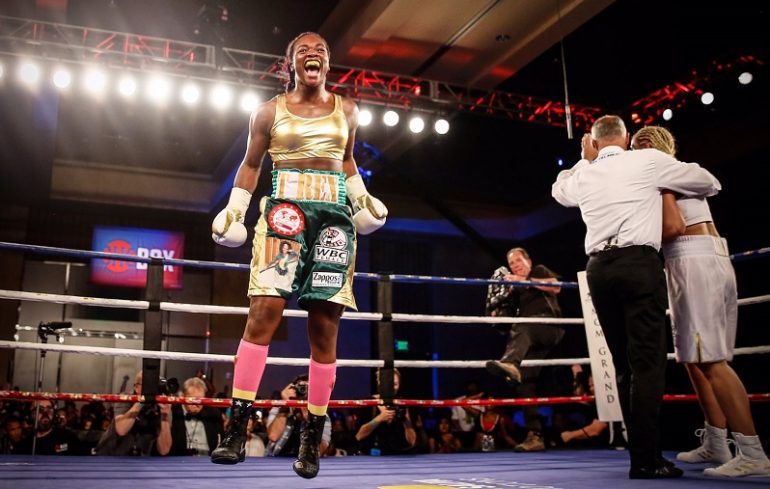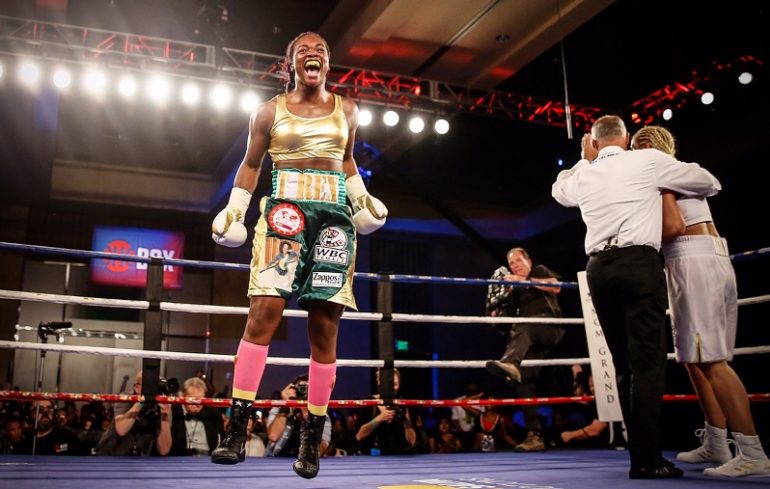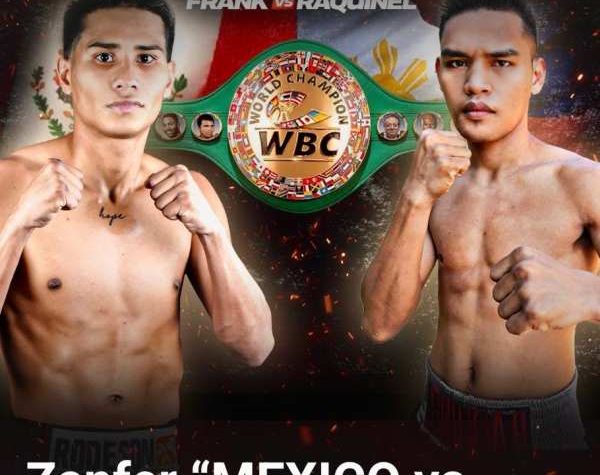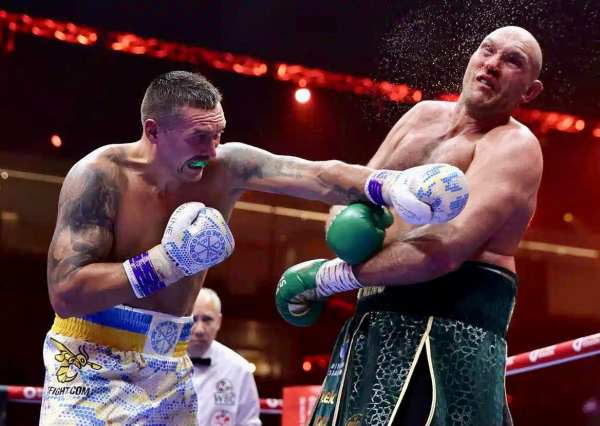

Friday, August 4 (continued); As Claressa Shields approached the ring inside the MGM Grand Detroit to face WBC women’s super middleweight titlist Nikki Adler, she was moving toward yet another defining moment in her athletic life. Though just 22, Shields had already experienced and conquered several such moments but, this time, the implications of success and failure extended far beyond her own circumstance. Not only was she attempting to dethrone an undefeated titlist and acquire the newly-created IBF strap; she also was shouldering the fate of women’s boxing in the United States.
Even before she turned professional in November 2016, the narrative was that Shields was to re-ignite the mass media trail blazed by Christy Martin, then Laila Ali, and be the catalyst of a new wave of mainstream popularity for women’s boxing in the United States, if not worldwide. That story line, however, was entirely dependent on what Shields did here and, going in, Adler was viewed as a sizable leap up the ladder, physically and in terms of resume. Although Adler scaled just a three-quarters of a pound heavier at the weigh-in, inside the ring, the German appeared markedly larger and thicker than the lithe and agile Shields, who glared at Adler, repeatedly made the “throat-slash” gesture and stomped her foot onto the canvas several times. Those actions sent a clear message: I am ready for you and I am ready for this moment.
Was she ever. Just as she had in both of her gold medal wins, as well as her world championship finals in the amateurs, Shields confronted the occasion directly and without fear. As if the occasion and the opponent’s perceived superior pedigree weren’t enough to exert pressure, the event also boasted star power, for mixed martial arts star Cris Cyborg and rapper Lyric Da Queen accompanied her to the ring while Hall-of-Famer Thomas Hearns, the Dirrell brothers (Anthony and Andre) and WBC/WBO women’s middleweight champion Christina Hammer were among the spectators.
The process by which Shields confirmed her superiority took just 36 seconds to complete. After Adler blocked Shields’ opening jab and probing hook with her high guard, the challenger connected with a blazing double jab that sliced through that guard. Seconds later, Shields landed her first flurry – a right/left and a jab/cross/jab – a sequence that made not only her prodigious hand speed advantage obvious but also Adler’s inability to block them or conjure a positive response. After she landed yet another right to the jaw, a darting jab and a hook to the body, the process reached its conclusion when Shields landed a heavy right to the jaw that nearly drove the German off her feet.
That was all Shields needed to open the floodgates and, from that point on, it was a massacre. Over the next eight minutes and 48 seconds of action, Shields showed off her extraordinary hand speed, her fluid combination punching and her ferocious killer instinct as she relentlessly pounded the courageous but overwhelmed German. It took less than a minute for Shields to redden Adler’s face and a little less than three minutes to produce the first of what would be several marks on the champion’s countenance. A massive hook with 47 seconds remaining in round two produced what could have been called a “but-for-the-ropes” knockdown by referee Michael Griffin but, even in the absence of what would have been Shields’ first knockdown as a pro, the two-time Olympic champion continued to put together a lights-out performance. Another right hand in the closing seconds of round two forced Adler to grab Shields heavily and a final right and hook to the body closed out another lopsided session.
The statistics from the first two rounds illustrated the degree of Shields’ blitzkrieg. In round one, Shields was 35 of 82 (including 28 of 59 power shots), while Adler failed to connect on any of her 20 punches. In the second, Shields landed 30 of her 71 total punches and 28 of her 54 power punches. The addled Adler’s output dropped from 20 to 17 punches but she managed to land two of them, both of which were jabs. After just six minutes of combat, the question shifted from whether Shields would win or lose to how long Adler would be able to stand up to the punishment.
The answer: At least two-and-three-quarters rounds’ worth and, if Adler had her way, she might have been able to absorb it for all 10 rounds. But Griffin recognized what everyone else saw, that this was a mismatch that should not continue. A huge left hook buckled Adler’s legs and caused Griffin to move in while another hook drove him even closer to ending the bout. A final flurry capped by a right to the face prompted Griffin to intervene and, when he did, neither Adler nor her seconds offered any argument.
The numbers favoring Shields were monumental: 136-6 in total punches, 18-4 in jabs and 118-2 in power connects. The accuracy gaps were equally eye-popping: 40%-7% overall, 22%-11% jabs and 46%-4% power. Additionally, Shields averaged 71.1 punches per round and 54 power shots per round, which translates to 106.7 and 81 power punches over three minutes, while Adler averaged 17.5 punches per two-minute round or 26.3 over three minutes.
What Shields produced was so dominating that maybe even she couldn’t have dared to dream it. Though she had shown above-average offensive technique in her previous three pro fights, she reached a new level against Adler. The occasional wildness of past fights had vanished; her blows were compact, comet-quick and concussive. Here, it was Adler’s toughness, not Shields’ inadequacy in terms of power, that prevented a knockdown from being scored.
In many eyes, Martin’s career was supposed to climax with a meeting with Lucia Rijker and Ali’s run was supposed to result in a fight with Ann Wolfe and it appears that Shields’ next defining moment will take place against Hammer, who, despite being a middleweight, appeared larger than Shields, the new two-belt titleholder at 168. While Martin-Rijker and Ali-Wolfe never happened, it appears Shields and Hammer will eventually fight each other. The scenario I envision is having the two fight in separate bouts on the same card – either in Detroit or in Germany – then, if they win as expected, have the fight sometime next year.
But what happens after that? As Hall of Fame writer/analyst Steve Farhood pointed out during the telecast, the talent pool in women’s boxing is painfully thin; BoxRec lists just 23 fighters at 168 and only 30 at middleweight. Perhaps the next showdown for the Shields-Hammer winner could be four-belt welterweight champion Cecilia Braekhus (who heads a talent pool numbering 70) but the “First Lady” is nearing her 36th birthday and may not be around by the time Shields and Hammer complete their business. Whatever happens, Shields proved beyond doubt that, whatever road she chooses, she’ll take those watching her on an exciting ride.
*
The co-feature between Vladimir Tikhonov and Jesse Angel Hernandez, won by Hernandez on a fifth round TKO, was a triumph of aggression, power and strength over technique, angles and mobility. In viewing the videos, I believed more in Tikhonov’s strengths because Ray Ximenez applied many of the same tactics in defeating Hernandez in a six-round majority decision that could have been unanimous, given the numbers (94-50 overall, 85-41 power). Indeed, in round one, Tikhonov used his assets to control range and ring position, as well as earn slight connects leads overall (23-19) and in power punches (14-10).
The bout’s trajectory began to shift in the second as Hernandez, though out-landed 28-26 overall and 19-17 power, asserted his size and harder punching while also cutting off the ring better. Tikhonov’s science wasn’t enough to slow Hernandez’s snowballing momentum and the results could be seen in the remainder of the bout. In the third, a round that saw them exchange 188 punches (99 for Hernandez, 89 for Tikhonov), Hernandez turned the tables by out-landing the Russian 37-25 overall, 13-6 jabs and 24-19 power while also being more accurate (37%-28% overall, 33%-22% jabs, 41%-31% power). In the fourth, Tikhonov tried his best to hold off Hernandez but again, Hernandez was even more productive, as he led 42-33 overall and 38-27 power, while also earning percentage leads of 47%-38% overall, 31%-22% jabs and 50%-45% power.
In the fifth, Hernandez dropped the hammer, as he cranked 66 punches to Tikhonov’s 42, 56 power punches to the Russian’s 27 and out-landed him 35-7 overall and 32-6 power while creating accuracy gaps of 53%-17% overall, 30%-7% jabs and 57%-22% power. The sustained punishment was too much for Tikhonov to handle and the fight was rightly stopped by referee Ansel Stewart. In all, Hernandez prevailed 159-116 overall, 38-31 jabs and 121-85 power as well as 39%-30% overall, 27%-23% jabs and 45%-35% power.
After saying so long to punch-counting colleague Andy Kasprzak and packing the laptops, I got a late-night meal from one of the food court restaurants, entered the night’s numbers into the master database and turned out the lights shortly after 2 a.m.
Saturday, August 5: I awoke five hours later and, after finishing the morning routines, I spent the next couple of hours on the laptop writing and polishing copy. According to the production memo, I was set to share a cab ride to the airport with technical director Frank Madrose because we shared a noon departure time from Detroit. He set the meeting time at 10:30 and, after arranging for a ride with the front desk, we were off.
We arrived at the airport shortly after 11 a.m. and went our separate ways because he was jetting to LaGuardia in New York City while I was flying to Pittsburgh. While going through security, I encountered an interesting snag: The thickness of my two laptops obscured the X-ray operator’s view to the point that I was asked to place one of them in a separate tray and have everything inspected again. The delay was slight, though I did arrive at my gate just eight minutes before the scheduled start of boarding.
Once aboard the aircraft, I was blessed to fly with Amy, a Kalamazoo resident working for AT&T, who was flying to Pittsburgh to attend a conference. She pointed out that, for the second time in three days, I was flying with a celebrity in our midst. Here, it was Sugar Ray frontman Mark McGrath, who she recognized as the host of the game show “Don’t Forget the Lyrics” on Fox from 2010. Having ignored the music scene since the early 1990s, I had no idea who he was.
We ended up chatting for the entire 45-minute flight and, by the end, we were Facebook friends. (I just might be getting the hang of this smart phone thing). The drive home was pleasingly uneventful and I even pulled into the driveway seven minutes earlier than my projected 4:15 p.m. arrival time.
As of this writing, I have no idea when my next trip will be. The schedule for August is relatively light and my CompuBox co-workers have most of September’s fights well covered. So, at least for the time being, my vantage point will emanate from the Home Office.





More News
Liu Gang, Brico Santig Join Forces
Highland’s Double Impact: August 18 at Lumpinee
Balajadia, Atencio in Action in Thailand